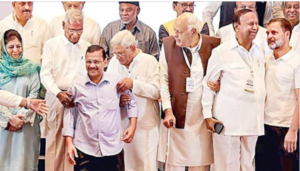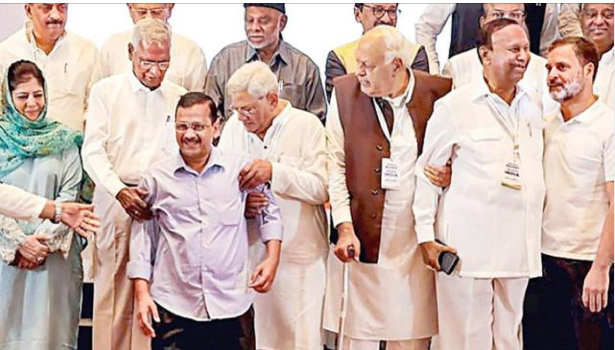In the vibrant tapestry of Indian politics, alliances and collaborations often emerge as pivotal forces shaping the nation’s trajectory. Recently, a significant development has unfolded as leaders from various political blocs across India have rallied behind Arvind Kejriwal, the Chief Minister of Delhi and a prominent figure in the country’s political landscape. This unprecedented show of unity has sparked intrigue and speculation, signaling potential shifts in power dynamics and coalition-building strategies. In this comprehensive analysis, we delve into the reasons behind this convergence, its implications for Indian politics, and the broader ramifications for governance and democracy.

Before delving into the recent developments, it is imperative to understand the political journey of Arvind Kejriwal. Emerging as a grassroots activist and anti-corruption crusader, Kejriwal rose to prominence as the face of the Aam Aadmi Party (AAP), a political entity founded on principles of transparency, accountability, and people-centric governance. His ascension to the position of Chief Minister of Delhi marked a paradigm shift in Indian politics, characterized by a departure from traditional party structures and a focus on citizen-centric policies.
India’s political landscape is characterized by a multitude of parties and ideologies, often leading to fragmented governance and coalition politics. In such a scenario, the formation of blocs or alliances becomes crucial for wielding influence and advancing shared agendas. These blocs may be based on regional affiliations, ideological leanings, or strategic alliances aimed at maximizing electoral gains. Understanding the dynamics of bloc politics is essential for comprehending the recent convergence of leaders around Arvind Kejriwal.
Several factors have contributed to the rallying of India bloc leaders behind Arvind Kejriwal. Firstly, his track record as Chief Minister of Delhi, marked by initiatives such as improved healthcare, education reforms, and efforts to combat air pollution, has garnered admiration and support from across the political spectrum. Secondly, Kejriwal’s pragmatic approach to governance, which prioritizes evidence-based decision-making and inclusive policies, resonates with leaders seeking effective governance models. Additionally, his reputation as a clean and incorruptible leader distinguishes him in a political landscape often marred by allegations of graft and malfeasance.
The convergence of leaders behind Arvind Kejriwal encompasses a diverse array of political figures and parties from across India. From regional heavyweights to emerging players, each endorsement adds a layer of complexity to the evolving political narrative. Notable figures include Mamata Banerjee, the Chief Minister of West Bengal, whose Trinamool Congress (TMC) has emerged as a formidable force in regional politics. Similarly, leaders from parties such as the Telangana Rashtra Samithi (TRS), Dravida Munnetra Kazhagam (DMK), and Shiv Sena have expressed solidarity with Kejriwal, citing shared goals and ideologies.
The rallying of India bloc leaders behind Arvind Kejriwal carries profound implications for the trajectory of Indian politics. Firstly, it signifies a departure from traditional party affiliations and a growing emphasis on issue-based politics and governance outcomes. Secondly, it underscores the potential for alternative leadership models to emerge, challenging the dominance of established political dynasties. Moreover, it highlights the fluid nature of alliances in Indian politics, where pragmatism often trumps ideological rigidity.
While the convergence of leaders behind Arvind Kejriwal holds promise, it is not devoid of challenges and criticisms. Some observers raise concerns about the sustainability of such alliances, citing divergent interests and ideological differences among participating parties. Additionally, skeptics question the motives behind the endorsements, speculating about hidden agendas and electoral calculations. Navigating these challenges will require adept leadership and a commitment to consensus-building among coalition partners.
As India prepares for upcoming ellesections and political realignments, the rallying of bloc leaders behind Arvind Kejriwal opens up a myriad of opportunities and obstacles. On one hand, it offers a potential alternative to entrenched political narratives and a platform for innovative policy solutions. On the other hand, it presents formidable challenges in terms of coalition management, electoral strategy, and governance effectiveness. The road ahead is fraught with uncertainties, but it also holds the promise of a more dynamic and inclusive political landscape.
The convergence of India bloc leaders behind Arvind Kejriwal represents a watershed moment in the annals of Indian politics. It transcends traditional party lines and ideological divides, signaling a shift towards issue-based politics and collaborative governance. While challenges abound, the collective endorsement reflects a growing recognition of the need for visionary leadership and pragmatic governance in addressing the multifaceted challenges facing the nation. As the political landscape continues to evolve, the rallying cry of unity behind Kejriwal serves as a beacon of hope for a more inclusive and responsive democracy in India.






мосбет http://mostbet6006.ru/ .
мос бет https://www.mostbet6006.ru .
1win кыргызстан https://familyclub.borda.ru/?1-6-0-00002163-000-0-0-1743051813/ .
1вин https://www.familyclub.borda.ru/?1-6-0-00002163-000-0-0-1743051813 .
1вин 1win6001.ru .
1win.pro http://1win6001.ru/ .
1вин сайт familyclub.borda.ru/?1-6-0-00002163-000-0-0-1743051813 .
1вин официальный сайт https://www.1win6001.ru .
1win online http://familyclub.borda.ru/?1-6-0-00002163-000-0-0-1743051813/ .
1win вход balashiha.myqip.ru/?1-12-0-00000437-000-0-0-1743258848 .
1 vin официальный сайт http://balashiha.myqip.ru/?1-12-0-00000437-000-0-0-1743258848 .
1вин вход http://1win6049.ru .
1 вин. 1win6049.ru .
1 вин войти http://alfatraders.borda.ru/?1-0-0-00004932-000-0-0-1743258210/ .
1 win официальный сайт 1 win официальный сайт .
вход 1win https://www.1win6049.ru .
1вин официальный http://www.1win6049.ru .
1.вин https://alfatraders.borda.ru/?1-0-0-00004932-000-0-0-1743258210 .
бк 1win http://alfatraders.borda.ru/?1-0-0-00004932-000-0-0-1743258210/ .
мостбет скачать на андроид svstrazh.forum24.ru/?1-18-0-00000136-000-0-0-1743260517 .
motbet http://www.svstrazh.forum24.ru/?1-18-0-00000136-000-0-0-1743260517 .
1win http://obovsem.myqip.ru/?1-9-0-00000059-000-0-0-1743051936 .
1вин официальный сайт вход http://obovsem.myqip.ru/?1-9-0-00000059-000-0-0-1743051936/ .
1wi. http://1win6050.ru/ .
1win вход на сайт 1win вход на сайт .
1vin казино 1vin казино .
1вин 1вин .
1win кейсы http://1win6050.ru/ .
1win играть https://www.1win6050.ru .
1 вин вход в личный кабинет http://www.1win6051.ru .
1вин кг https://1win6051.ru .
1вин 1вин .
1вин кг https://1win6052.ru .
mostbest mostbet6029.ru .
one win one win .
мостбет мобильная версия скачать http://www.mostbet6029.ru .
1win казино 1win казино .
1вин кыргызстан https://1win6053.ru .
1вин официальный сайт 1вин официальный сайт .
1вин бет официальный сайт https://1win6053.ru/ .
1 win moldova https://1win5011.ru .
cazinouri online moldova http://www.1win5011.ru .
1 win md https://www.1win5011.ru .
1win молдова 1win молдова .
мостбет мобильная версия скачать https://mostbet6012.ru/ .
скачать mostbet https://mostbet6012.ru .
вин 1 1win6009.ru .
1вин официальный сайт http://1win6009.ru/ .
мостбет скачать казино mostbet6012.ru .
1 вин 1win6009.ru .
1 ван вин 1 ван вин .
мрстбет http://mostbet6012.ru/ .
Купить диплом о высшем образовании!
Мы предлагаем дипломы психологов, юристов, экономистов и прочих профессий по разумным ценам. Вы приобретаете документ через надежную компанию. : aromatov.wooden-rock.ru/forum/topic.php?forum=1&topic=19564
Thanks for the article https://l-spb.ru/
банкротство физ лиц банкротство физ лиц .
банкротство физлиц https://bankrotstvo-fiz-lic-moscow.ru/ .
банкротство граждан банкротство физ лиц .
Покупка дипломов ВУЗов по всей России и СНГ — с печатями, подписями, приложением и возможностью архивной записи (по запросу).
Документ максимально приближен к оригиналу и проходит визуальную проверку.
Мы даем гарантию, что в случае проверки документа, подозрений не возникнет.
– Конфиденциально
– Доставка 3–7 дней
– Любая специальность
Уже более 2328 клиентов воспользовались услугой — теперь ваша очередь.
Смотреть тут — ответим быстро, без лишних формальностей.
Thanks for the article. Here’s more on the topic https://great-galaxy.ru/
проверика организации proverit-kontragenta.ru .
проверика контрагента proverit-kontragenta.ru .
Thanks for the article. Here’s more on the topic https://remonttermexov.ru/
Here’s more on the topic https://voenoboz.ru/
в уфе купить аттестат за 11 класс в уфе купить аттестат за 11 класс .
дренаж вокруг дома цена под ключ .
Here is another site on the topic https://photo-res.ru/
Thanks for the article https://salfetka.at.ua/forum/18-7001-1 .
Website https://fishexpo-volga.ru/ .
Website https://church-bench.ru/ .
La Clínica de Urología Moderna reúne evaluaciones, diagnósticos y opciones de tratamiento en un solo portal práctico.
Si quieres entender en qué consiste una consulta de urología, entra en la Clínica de Urología Moderna y revisa sus servicios.
Para conocer las opiniones de otros pacientes y entender los resultados, visita la Clínica de Urología Moderna en línea.